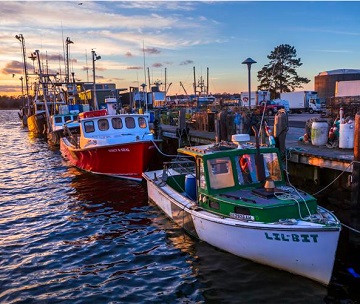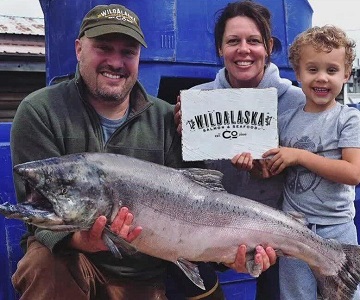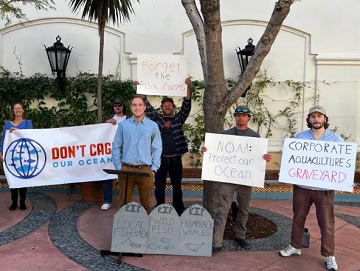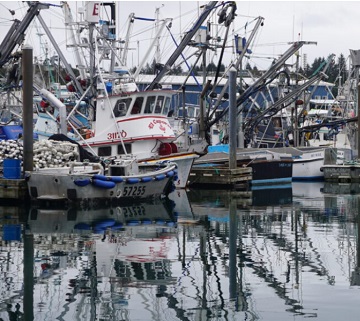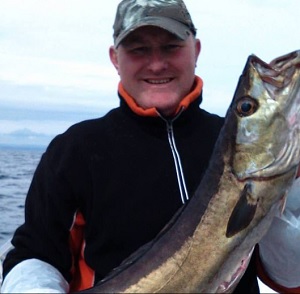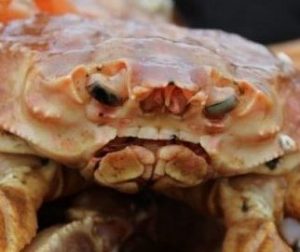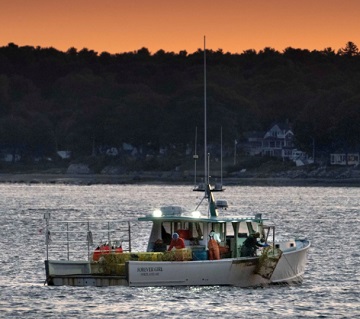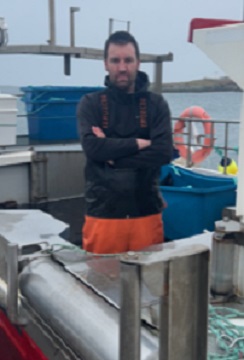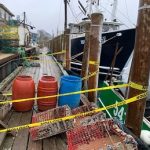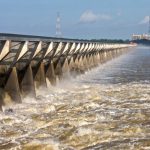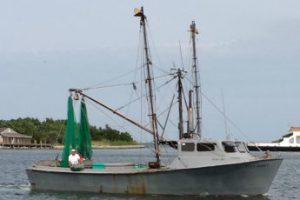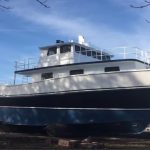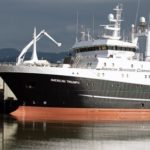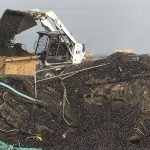Tony Wood has one goal in mind: getting the absolute freshest sockeye salmon and other seafood to customers across the country. To accomplish that goal “Captain Tony,” as he is known, splits his time between his Carbondale home and the remote area of Bristol Bay, Alaska where he leads a small commercial fishing fleet. How he got to that place is a story unto itself. Wood studied aviation at Southern Illinois University in Carbondale. During his collegiate summers, Wood worked as a fishing guide and apprentice pilot in King Salmon, Alaska. After relocating to Alaska, he started his own air taxi and guide business in the region. He was introduced to commercial fishing when a friend asked him to help for a couple of weeks on his vessel. Wood offered to be paid in fish, which he brought back to the Midwest. >click to read< 08:16
Monthly Archives: April 2023
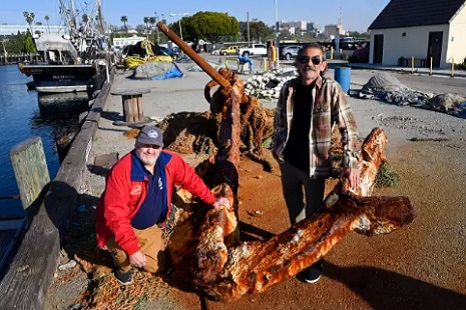
San Pedro fisherman pulls up a mammoth relic from the past
Talk about an epic haul. It was a beautiful fall day in mid-November when San Pedro fishing boat skipper Vince “Enzo” Lauro and his five-man crew on the 70-foot-long St. Joseph headed out for what was to be a routine day collecting squid. But what they wound up hauling onboard nearly rolled the vessel: An old, 8,000-pound anchor that had been sucked down long ago into the ocean floor several miles off the Long Beach breakwater opening. Lauro, 59, described the find succinctly: “Crazy.” 6 photos, >click to read< 14:58
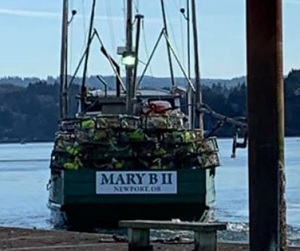
F/V Mary B II: Why Coast Guard sluggishness?
It has been more than four years since the deadly capsizing of the crabbing vessel F/V Mary B II while attempting to cross the Yaquina Bay bar inbound in stormy weather on Jan. 8, 2019, killing the skipper and two crew members as Coast Guard vessels were nearby. A Coast Guard Marine Casualty Investigation board convened in Newport, May 13-17, 2019, and soon revealed the captain had alcohol and methamphetamine in his system and one crew member had cannabinoids. The captain had previously operated off New Jersey and wasn’t very familiar with Pacific Coast conditions. >click to read< 13:03 Search Results for F/V MARY B II
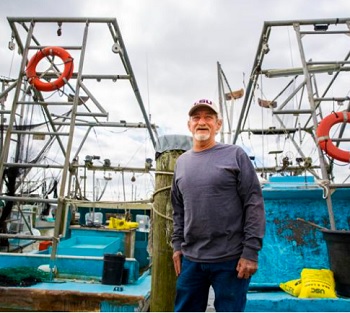
As seafood sales rise for Lent, Louisiana shrimpers say their industry is in trouble
With Lent elevating sales of crawfish, fish and shrimp across Louisiana, many local fishermen and shrimpers say they aren’t benefitting. “We’ve been here a long time, and yet we’re just going to get shoved out of the way. When importers come in and start buying cold storage and start buying infrastructure, we’re going to lose our way of life, and Louisiana is going to lose a lot. They’re more at stake than anybody because we’re known for our seafood. That’s why people come to Louisiana is for our seafood and for our culture,” said Acy Cooper, the president of the Louisiana Shrimpers Association. >click to read< 12:02
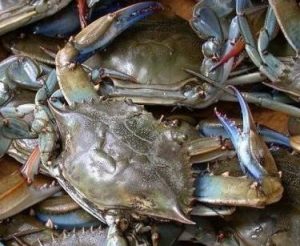
‘They are serial killers’: How blue crabs are devastating the fishing industry in southern France
For the last three years, the Canet-en-Roussillon lagoon, in southern France, has been under invasion from a blue crab which devours almost everything in its path. Scientists are trying to find the cause of the invastion, but for the time being the only way to keep the numbers under control is fishing. Since the crab tastes so good, local restaurant owners are considering putting it on the menu. Since the invasion began in 2020, the two friends (Yves Rougé and Jean-Claude Pons) have meticulously noted down the number of blue crabs they have caught. “We started seeing them in 2017, it’s been five or six years since they’ve been here,” explains Jean-Claude Pons. “We used to see one or two, then ten, and then it was kilos every day.” >click to read< 10:07
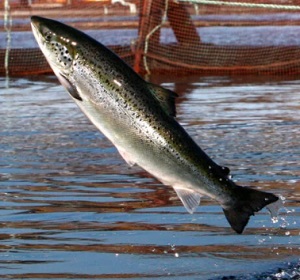
1st ocean fish farm proposed for East Coast off New England
A New Hampshire group wants to be the first to bring offshore fish farming to the waters off New England by raising salmon and trout in open-ocean pens miles from land, but critics fear the plan could harm the environment. The vast majority of U.S. aquaculture, the practice of raising and harvesting fish in controlled settings, takes place in coastal waters or on land, in tanks and ponds. But New Hampshire-based Blue Water Fisheries wants to place 40 submersible fish pens in water about 7.5 miles (12 kilometers) off Newburyport, Massachusetts, on two sites that total nearly a square mile, according to federal documents. >click to read< 09:03
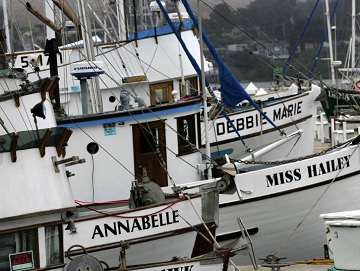
State, federal officials vow to take quick action on Federal Fishery Disaster Declaration for salmon fishing industry
State and federal officials are vowing to move quickly to secure disaster aid for Californians affected by the closure of this year’s commercial and recreational salmon season, which could have an economic impact of $1.4 billion, according to one industry group. The administration of Gov. Gavin Newsom requested a Federal Fishery Disaster Declaration from U.S. Commerce Secretary Gina Raimondo after a decision Thursday by the Pacific Fishery Management Council to recommend full closure of both commercial and recreational salmon seasons this year. It’s unclear what that might mean in terms of total dollars and eligible stakeholders. >click to read< 08:03
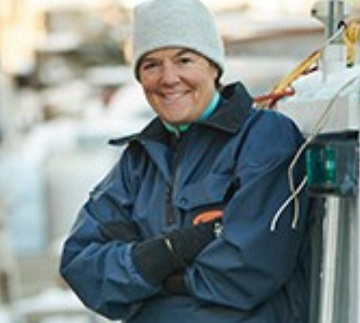
Deadliest Catch’s newest star: A Q&A with Maine’s Linda Greenlaw
The newest season of Deadliest Catch will feature a Maine connection, with popular fisherman, author and reality TV star Linda Greenlaw joining the cast. Q: You’re known to most Mainers and wider audiences as a fisherman of swordfish and lobster. Did you find transitioning to crab fishing difficult for “Deadliest Catch?” A: Transitioning to the crab fishery was not too difficult for me – I have been involved in the offshore red cred fishery here in New England and have been fishing fixed gear on and off since I was a kid. The difference was primarily hauling single, massive pots as opposed to trawls of smaller traps. Finding crab was the biggest challenge. This was my first experience with Bairdi crab and also my first trip on the Bering Sea. >click to read< 16:21
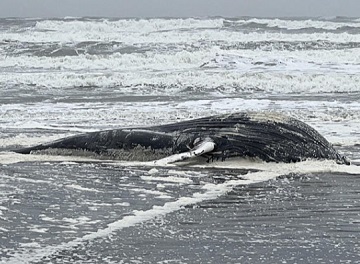
Ignoring dead whales, NOAA proposes another site survey off New Jersey
“Damn the whales, full speed ahead” seems to be the offshore wind policy of Biden’s NOAA. They now propose to approve yet another site survey, just 10 miles off Atlantic City. These surveys are the top suspect for the recent wave of dead whales, centered on New Jersey. The site is a big one because the offshore wind project is huge. Phase 1 is a whopping 1,500 MW, which means over 100 monster turbine towers. The survey area is around 1,500,000 acres or an incredible 2,300 square miles. Ironically the project is called Atlantic Shores, which is where all the dead whales are washing up. More deeply, the Atlantic Shores Wind Project has yet to be approved and may never be. Hugely disruptive site surveys should not be authorized until the Project is approved. >click to read< 13:57
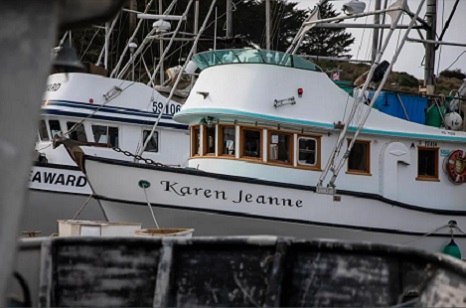
California could have avoided salmon season shutdown. Did we learn nothing last time? by Sarah Bates
I fish salmon commercially from Fisherman’s Wharf in San Francisco. You can see the Golden Gate Bridge from my boat, where Chinook have passed for millions of years on their journey from the ocean, through the bay and Delta, up the Sacramento River. There is communal anticipation before the first trip of the summer, checking anchor winches and hydraulic hoses, safety equipment, leaders, weather reports. Boats are freshly painted and deck tanks for holding fish are installed. Not this year – this year feels like a funeral. >click to read< by Sarah Bates 09:52
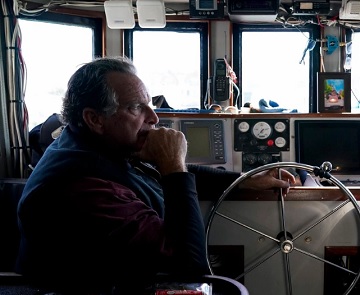
Pacific Fishery Management Council approves salmon fishing ban for much of West Coast
A federal regulatory group voted Thursday to officially close king salmon fishing season along much of the West Coast after near-record low numbers of the fish, also known as chinook, returned to California’s rivers last year. The Pacific Fishery Management Council approved the closure of the 2023 season for all commercial and most recreational chinook fishing along the coast from Cape Falcon in northern Oregon to the California-Mexico border. Limited recreational salmon fishing will be allowed off southern Oregon in the fall. Biologists say the chinook salmon population has declined dramatically after years of drought. Though the closure will affect tens of thousands of jobs, few are opposed to it. Many fishers say they want to take action now to guarantee healthy stocks in the future. >click to read< 09:03
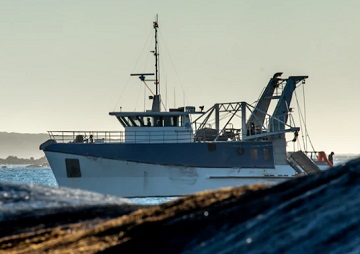
Greek immigrant and pioneering fisherman Kon Paleologoudias’s legacy in Venus Bay and Port Kenny
When Konstantinos Paleologoudias left Greece as a fresh-faced 18-year-old fitter and turner in the 1950s he began an adventure that would help shape two small towns 14,000 kilometres away on South Australia’s west coast. Konstantinos, also known as Kon Paul, established a fish processing factory at Port Kenny and while the size of the prawn boat fleet in Venus Bay has fluctuated, the three remaining licensed boats are all owned by the Paleologoudias family. More than 70 years since Kon emigrated, his feats have been recognised in Venus Bay, with the naming of a large sculpture of a pelican, Pauly. Photos, >click to read< 07:45
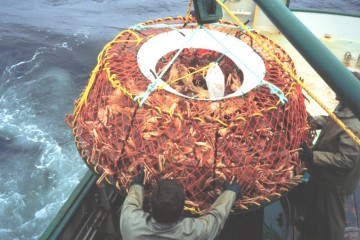
Price setting panel sets snow crab at $2.20 per pound — down over $5 from 2022 season
The Fish, Food and Allied Workers Union, which represents Newfoundland and Labrador’s inshore fishermen, had asked the panel for a price of $3.10, and say fishing at $2.20 per pound is unsustainable. FFAW president Greg Pretty said crab committees throughout the province have decided not to fish at $2.20 per pound, and will review their stance in the coming weeks. “There’s no appetite to go fishing for nothing,” Pretty told CBC Radio Thursday, calling the decision a catastrophe that rivals the cod moratorium of 1992. “You can’t get crew members for that. You can’t even pay crew members on that type of money…. There’s a net economic point where it doesn’t make any sense to fish, and that panel hit right on it. Spot on.”>click to read< 20:02
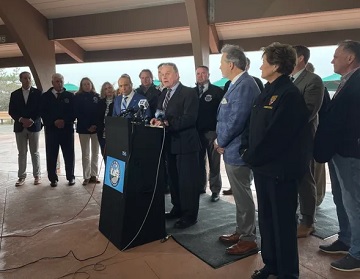
‘Tell us why’: Monmouth Commissioners call for investigation into surge of whale deaths
Monmouth County officials stood in the mist at Seven Presidents Oceanfront Park on Wednesday, where they gathered to call for an immediate stop to offshore wind energy work off New Jersey’s coast. Their announcement marked a new addition to a growing group of elected officials who are demanding answers on recent deaths among whales and dolphins across the region, and who allege offshore wind survey work is the cause. As of Wednesday afternoon, 10 whale deaths had been recorded along the Jersey Shore since Dec. 1. In addition, two separate pods of dolphins had stranded since early February on New Jersey beaches. Another three individual dead dolphins and one porpoise had washed ashore in separate strandings. >click to read< 16:47
Panel Decision on Crab Signals Economic Crisis for NL
The Standing Fish Price Setting Panel announced their decision on the price of snow crab for the start of the 2023 fishing season, selecting the Association of Seafood Producer’s (ASP) second price submission of $2.20, over the Negotiating Committee’s price of $3.10. Crab Committees throughout the province have made the unanimous decision to not fish at the unsustainable price and will review this position in the coming weeks. “The Panel’s decision today has put our industry in the most precarious situation it’s ever been in. The Final Offer Selection (FOS) process has completely lost its way when bottom of the barrel prices are being selected without absolutely any merit,” says FFAW-Unifor President Greg Pretty. >click to read the press release< 15:25
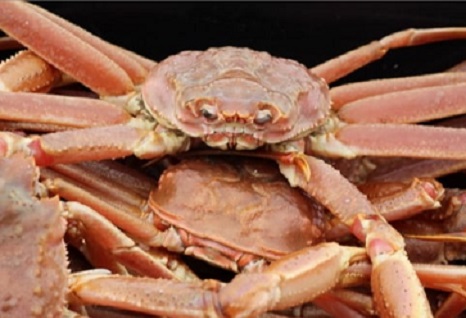
Pot-to-Plate – SEA-NL recommends $5-$6/lb wharf price for crab to the general public
Seaward Enterprises Association of Newfoundland and Labrador (SEA-NL) recommends its membership of inshore enterprise owners sell snow crab at the wharf to the general public for $5 or $6/lb to start the season. “You won’t sell all your crab to the local market, but you will sell some for $5 or 6/lb — double the price to be set by the pricing panel, and a bargain to the public,” says Pam Patten, SEA-NL president and a Fortune-based inshore enterprise owner. “The extra money will help until the price of snow crab picks up in world markets, and at the same time the inshore fleet can build a local market for fresh seafood.” >click to read the press release< 12:34
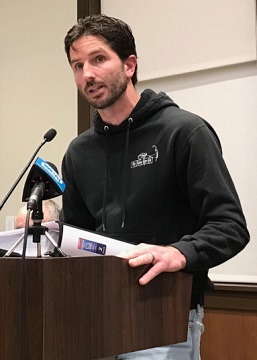
Fisherman Launches Petition Against Release of Pilgrim Water
Bourne resident Ryan Collins, whose father and grandfather were fishermen, continues the family tradition. He has now become an advocate as well. Collins has collected more than 214,000 signatures on a petition asking the owners of the former Pilgrim nuclear plant not to release radioactive wastewater into Cape Cod Bay. He said he has been listening to concerns from his fellow fishermen as well as family, friends, and neighbors about Holtec Decommissioning International’s proposed solution to disposing of the water from various systems at the shuttered plant. “Everyone I am speaking to is against it,” he said. Eight weeks ago, he started his online petition at Change.org. >click to read< 11:29
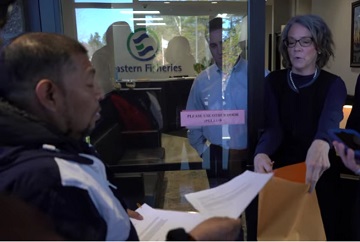
Eastern Fisheries severs ties with staffing firms in wake of NLRB case
Eastern Fisheries Inc., a global supplier of seafood based in New Bedford, Massachusetts announced Monday that it is going to employ workers directly instead of through staffing firms. Eastern Fisheries said it has long used staffing firms, but the decision to employ workers directly comes after a decision in an NLRB case. The company said one worker from a staffing firm had filed an unfair labor practice charge with the National Labor Relations Board claiming the company had improperly asked the staffing firm to stop sending the employee to its workplace. >click to read< 10:36
Undocumented workers boxed out as Eastern Fisheries restructures – Last week, Eastern Fisheries cut ties with its main staffing agencies. The company told 110 of its workers on Friday that they could reapply for the same jobs they previously held as direct employees of Eastern Fisheries. >click to read<
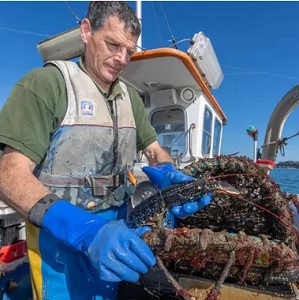
Not for the pot: how ‘V-notching’ lobsters may help save them
Cornishman Ned Bailey has caught and returned ‘notched’ lobsters for years as part of a broader effort to preserve stocks. But many fishers do not. He tosses out stray crabs, several starfish and a squirming conger eel. Every so often he pulls out a lobster: if the carapace is over 90mm (3.5in) long, he keeps it; if not, it’s thrown back into the sea, in line with regulations. But today, one lobster, the underside of its tail bursting with clusters of inky-black eggs, is kept aside. This is a berried hen, a pregnant female, carrying about 20,000 eggs. Bailey cuts a small “V” into its dappled royal-blue and yellow tail before gently laying the lobster back in the water. Now she is marked as illegal for others to land – and with any luck her reproductive potential is secured for a few more years. >click to read< 09:39
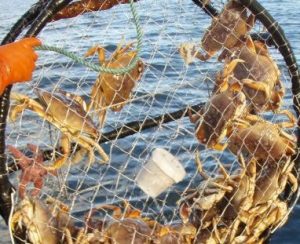
For Whales and Crabbers, Finding Balance Is Getting Harder
In Dick Ogg’s 25 years of commercial fishing, he’s had a few close encounters with whales—mostly while pulling Dungeness crab pots off the ocean floor. “I’ve had whales right next to me,” within about five meters, says Ogg. “They follow me, they watch, they’re curious. And then they go on about their business.” Ogg is fortunate his interactions have been so leisurely. For nearly a decade, California’s whales and crabbers have been locked in a persistent struggle. From 1985 to 2014, the National Oceanic and Atmospheric Administration (NOAA) reported an average of 10 whales were entangled in fishing gear each year along the west coast of the United States. >click to read< 07:53
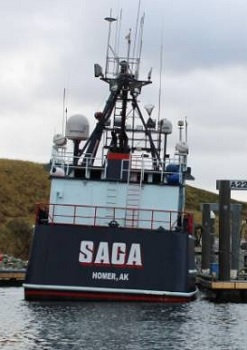
Why would a pediatric neurosurgeon go crab fishing in the Bering Sea?
The fears and anxieties associated with my role as a pediatric neurosurgeon are those related to my patients’ lives I have put at risk during the past 20 years. The last decade presented an opportunity for me to learn something from the commercial fishing industry about life circumstances where we experience fear and anxiety. In 2009, I was privileged to work on the F/V Miss Colleen, a commercial salmon fishing gillnet boat in Bristol Bay, Alaska. Then, in the fall of 2019 and winter of 2021, I was fortunate to be a deckhand on the F/V Saga, a commercial crab fishing boat in the Bering Sea profiled on the Discovery show Deadliest Catch. Both experiences had a profound effect on me and taught me how to switch from a “my life is at risk” mentality to one focused on preventing mistakes from happening through teamwork and effective communication. It occurred to me that there is no room for error in both the health care and commercial fishing industries. Both giving a patient the wrong medication or going overboard in rough seas can lead to death. >click to read< 18:08
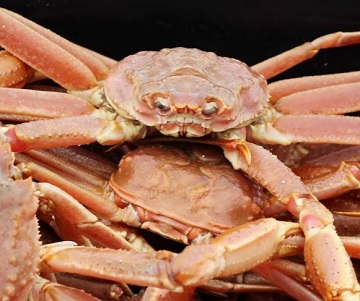
Harvester and FFAW frustrations about snow crab prices looming ‘on the eve of the fishery’
It will be a few more days before Newfoundland and Labrador snow crab harvesters will find out what they will be paid for their catches. The province’s price setting panel is still reviewing the latest offers from the Fish Food and Allied Workers and the Association of Seafood Producers. However, it is becoming obvious that fishing incomes from crab this season will be half of what they were last season. The FFAW had promised to provide information about the new offers on Friday, but later backed down. That information blackout has led to more frustration among fish harvesters. >click to read< 13:03
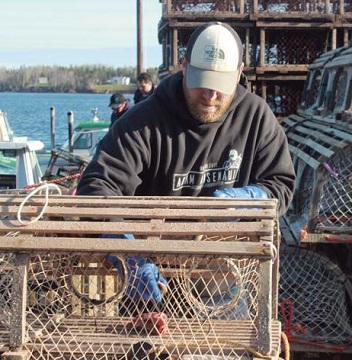
Impact of bait closure heightens
The Atlantic spring herring fishery will not reopen this year, and while no decision has been made on mackerel yet, the stock remains deep in the critical zone. When the closure was announced in 2022, fishers already had bait stored up from the previous year. This year they expect to feel the full effects with the higher cost of sourcing alternatives. Allen Fay, a former bait fisherman out of North Lake who now fishes lobster, tuna and halibut, says the bait bill could double. It will be especially hard on younger fishers just getting into the industry who are already paying a lot for gear. Like many fishers, as well as the PEI Fishermen’s Association, he feels the closure doesn’t make sense because Americans will continue to fish the same mackerel stocks. >click to read< 11:53






